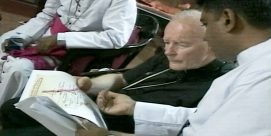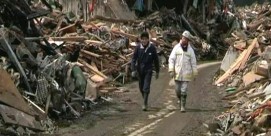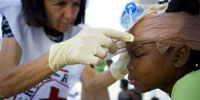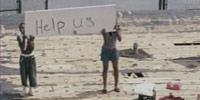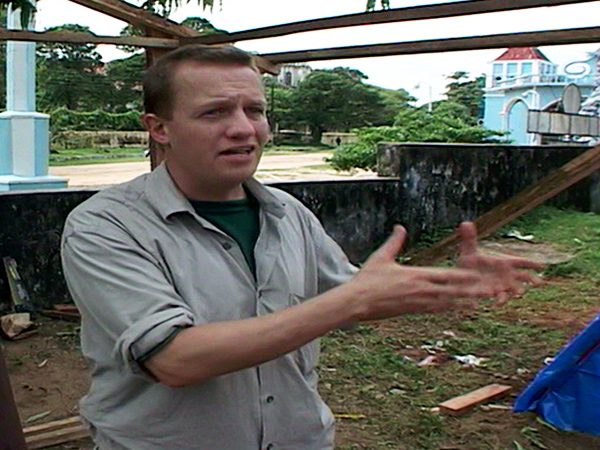 KIM LAWTON: From a command center on the remote eastern coast of Sri Lanka, Catholic Relief Services emergency coordinator Steve Michel is briefing staff and volunteers who have come from the US and around the world. They are partnering with a local Catholic social services agency that already had operations on the ground.
KIM LAWTON: From a command center on the remote eastern coast of Sri Lanka, Catholic Relief Services emergency coordinator Steve Michel is briefing staff and volunteers who have come from the US and around the world. They are partnering with a local Catholic social services agency that already had operations on the ground.
STEVE MICHEL, Catholic Relief Services: They have an office here, they have vehicles. They have computers. So we can come in and sort of work directly with them. They know the local context. So it gives us a great head start.
LAWTON: Faith-based groups across the spectrum are taking a leading role here in Sri Lanka as relief efforts enter a new phase in the crisis--moving from the emergency immediate aftermath to addressing the huge long-term consequences. According to the Sri Lankan government, in this nation of 19 million, nearly 40,000 people were killed, and more than 800,000 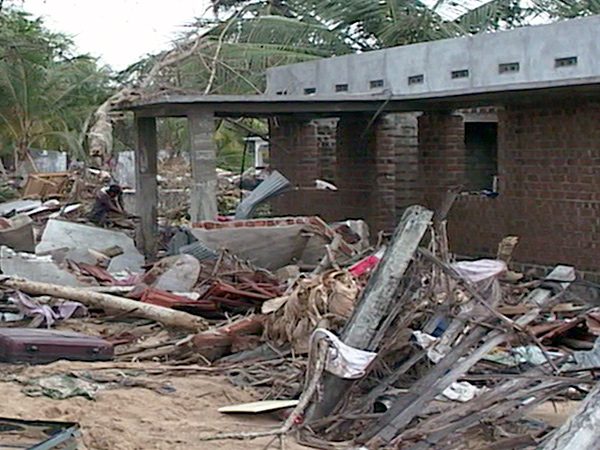 displaced. This is one of the hardest-hit areas on the east coast—entire villages completely wiped away. Many of the people who survived are now living in refugee camps. The government says they can’t rebuild here because it’s too close to the ocean. The government and humanitarian groups are still discussing where the displaced can go. In the meantime, they’re in temporary shelters, many in Buddhist and Hindu temples, churches and schools. In the east coast district of Batticaloa, three Catholic schools have been turned into refugee camps. For now, the Catholic Church has been able to provide enough food and clean water, but aid workers are worried about how long that can be sustained. The government is lobbying for schools to reopen as soon as possible. Catholic Relief Services workers are designing transitional housing that can be constructed quickly.
displaced. This is one of the hardest-hit areas on the east coast—entire villages completely wiped away. Many of the people who survived are now living in refugee camps. The government says they can’t rebuild here because it’s too close to the ocean. The government and humanitarian groups are still discussing where the displaced can go. In the meantime, they’re in temporary shelters, many in Buddhist and Hindu temples, churches and schools. In the east coast district of Batticaloa, three Catholic schools have been turned into refugee camps. For now, the Catholic Church has been able to provide enough food and clean water, but aid workers are worried about how long that can be sustained. The government is lobbying for schools to reopen as soon as possible. Catholic Relief Services workers are designing transitional housing that can be constructed quickly.
MICHEL: We are just building this model, trying to get an idea of whether it seems like a viable option for something sort of, not immediate, not a tent, but something that could last a year or two.”
LAWTON: On the other side of the island, the Gangaramaya Buddhist Temple in Colombo is also developing an ambitious shelter plan for both the short and long term. Students at the temple’s vocational training program are helping with construction. Under a government rebuilding program, tsunami victims of all faiths will apply for new housing through the temple. Venerable Podi Hamuduruwo is priest there.
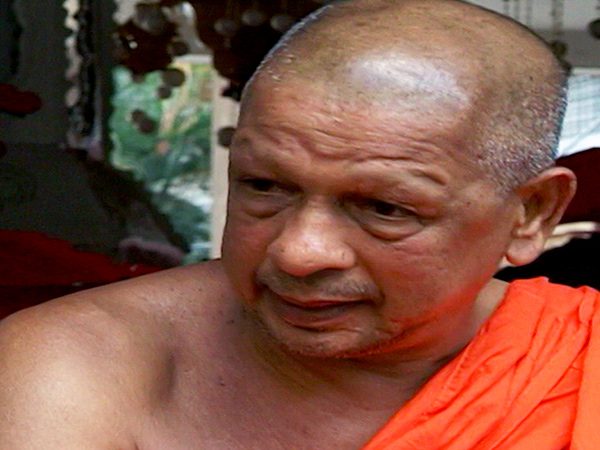 VENERABLE PODI HAMUDURUWO, Buddhist Priest: ’Til they get land, they must have a place to live. Because now, they have temporary schools, temple, church, mosque and common place they use. That is very troublesome.
VENERABLE PODI HAMUDURUWO, Buddhist Priest: ’Til they get land, they must have a place to live. Because now, they have temporary schools, temple, church, mosque and common place they use. That is very troublesome.
LAWTON: Religious groups have been sending desperately needed supplies to the affected regions. At the evangelical relief center outside Colombo, volunteers assemble packages of tea and food items to help a family of four eat for a week. The materials were purchased locally…with donations from abroad. In the past, there have been interfaith concerns over evangelical missionary activities. But Godfrey Yogarajah of the evangelical council denies that aid will be used for proselytizing.
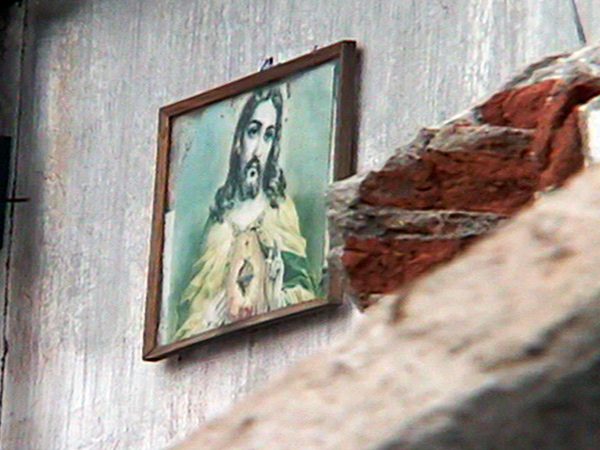 GODFREY YOGARAJAH, Nat’l Evangelical Council: We give it in the name of Jesus, but it has no kind of strings attached. We don’t evangelize at this particular time at all.”
GODFREY YOGARAJAH, Nat’l Evangelical Council: We give it in the name of Jesus, but it has no kind of strings attached. We don’t evangelize at this particular time at all.”
LAWTON: Leaders of Sarvodaya, one of the largest non-governmental organizations here, also say they’ve been overwhelmed by the international outpouring of aid. Sarvodaya is a community development group based on Buddhist principles. Much of its support has come from American Buddhists and Christians. But not all of the help is useful. Valuable storage areas have been taken up by boxes of donated clothing that is inappropriate for the climate and the culture.
UNIDENTIFIED MAN: We don’t know what to do with them. These are stuff sent to us with love and affection. We don’t want to burn them, and we cannot distribute them either.”
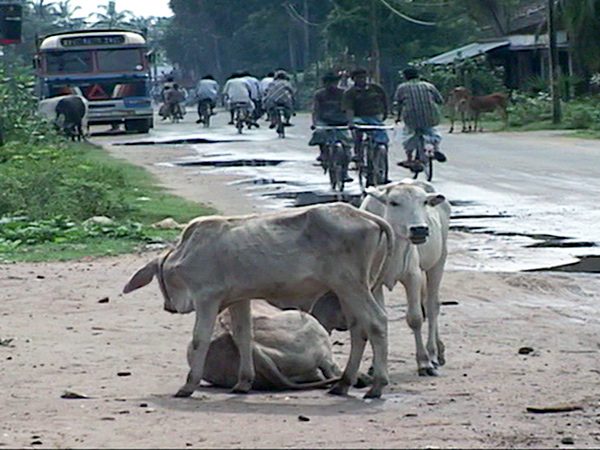 LAWTON: Getting the right supplies to where they are needed most is a huge logistical undertaking. The hundreds of thousands of victims are spread across two-thirds of Sri Lanka’s coastline. Access to many of the affected areas is difficult. Phone service is intermittent. Roads are poor. Nighttime travel is risky because of the wild elephants that come out to graze by the roadside. Beyond relief efforts, Sarvodaya has developed what it calls a “national reawakening plan” to rehabilitate devastated communities and generate new livelihoods. Although Sri Lanka has long been torn by civil and religious strife, Sarvodaya’s influential founder, Dr. A.T. Ariyaratne says such divisions are being set aside for the moment.
LAWTON: Getting the right supplies to where they are needed most is a huge logistical undertaking. The hundreds of thousands of victims are spread across two-thirds of Sri Lanka’s coastline. Access to many of the affected areas is difficult. Phone service is intermittent. Roads are poor. Nighttime travel is risky because of the wild elephants that come out to graze by the roadside. Beyond relief efforts, Sarvodaya has developed what it calls a “national reawakening plan” to rehabilitate devastated communities and generate new livelihoods. Although Sri Lanka has long been torn by civil and religious strife, Sarvodaya’s influential founder, Dr. A.T. Ariyaratne says such divisions are being set aside for the moment.
A.T ARIYARATNE, Sarvodaya: Certainly, this crisis is bringing people together. Those who are hanging on to their caste, race, religion, politics, race, language—they have forgotten all that and everybody as people, they have come together.
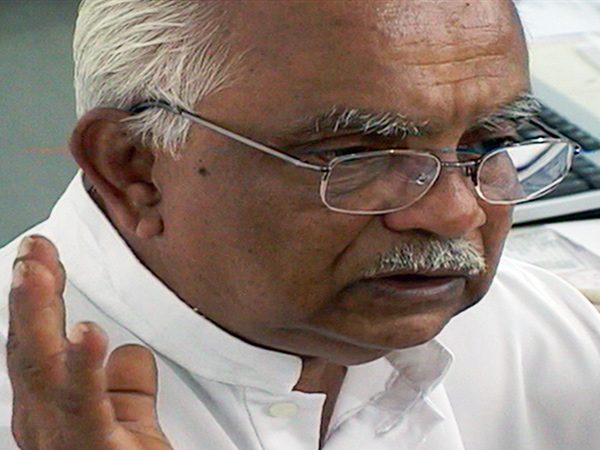 LAWTON: While the physical rebuilding work goes forward, religious leaders here say the emotional and spiritual rebuilding is just as challenging. Almost every citizen here knows someone who died. Many lost multiple family members. In the refugee camps, victims seem almost compelled to tell their stories. This fisherman lost two children, his boat and his home. Camp workers say the children have been particularly affected. Kids who once played in the ocean now wake up in the middle of the night terrified that the waves are coming again. Relief groups are launching trauma counseling programs to help people deal with the grief. Counselors from the US and other places are sponsoring sessions to train local workers.
LAWTON: While the physical rebuilding work goes forward, religious leaders here say the emotional and spiritual rebuilding is just as challenging. Almost every citizen here knows someone who died. Many lost multiple family members. In the refugee camps, victims seem almost compelled to tell their stories. This fisherman lost two children, his boat and his home. Camp workers say the children have been particularly affected. Kids who once played in the ocean now wake up in the middle of the night terrified that the waves are coming again. Relief groups are launching trauma counseling programs to help people deal with the grief. Counselors from the US and other places are sponsoring sessions to train local workers.
YOGARAJAH: Right now, people are just numb and shocked, and they are non-functional. And it will take a few weeks from now for the grief to really sink in, and that’s the time we may have people who are trained counselors, who would go alongside these people and help them deal with the grief, to bring out the grief, and to actually face what they have gone through.”
KEN HACKETT, Catholic Relief Services: We will not be starting livelihoods again until these people are allowed to grieve and recover.
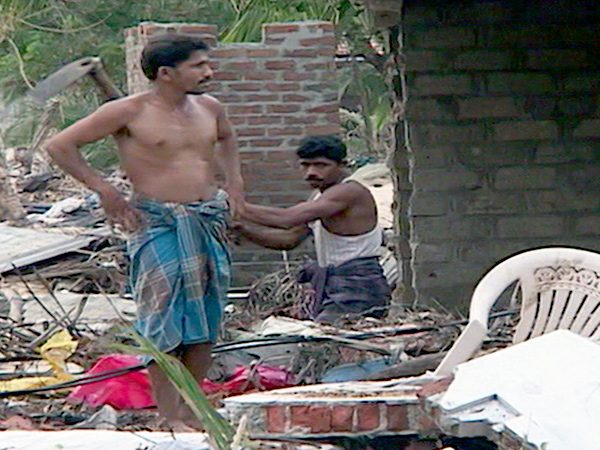 LAWTON: Some victims say they believe the tsunami is a punishment or a curse from God. Others are urging acceptance.
LAWTON: Some victims say they believe the tsunami is a punishment or a curse from God. Others are urging acceptance.
VENERABLE PODI: We are not talking about whose fault.
LAWTON: It’s no one’s fault, says Venerable Podi. Just part of the dangers of nature. Sarvodaya’s Dr. Ariyaratne, a Buddhist philosopher, believes the tsunami happened because the cosmic laws governing the universe are out of balance. He says things like greed, child abuse and environmental degradation have disturbed the stability of the world.
ARIYARATNE: When one percent of the human population violates this cosmic law pertaining to individual action—karma—it affects the other 99 percent.”
LAWTON: During a visit to the region last week, Washington Catholic Cardinal Theodore McCarrick tried to offer spiritual comfort.
CARDINAL THEODORE McCARRICK: We know that you have suffered much and have lost people and houses. But we also know that God loves us and that God cares for us and is a good father. One day when we see him face to face, we will understand this, which we cannot understand now.
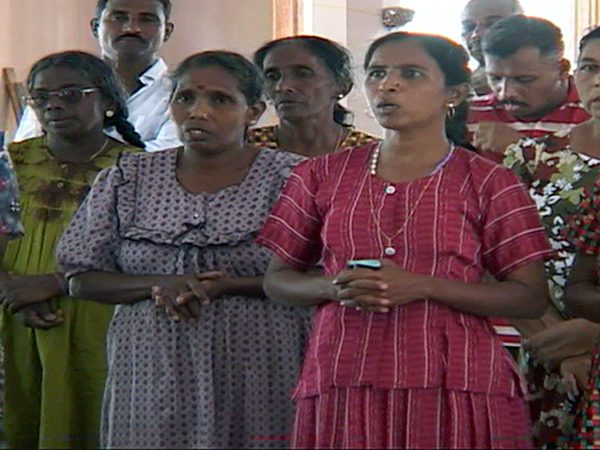 LAWTON: Father Joseph Mary lost 130 of his parishioners. While his own faith was shaken, in his prayers, he says he is holding on to hope.
LAWTON: Father Joseph Mary lost 130 of his parishioners. While his own faith was shaken, in his prayers, he says he is holding on to hope.
PRIEST (praying): Our people have no faith in you. Yet, through this nightmarish experience our people have gone through in broad daylight, we will rise again because you are there.
LAWTON: Many here say do they indeed see hope…even in the midst of great tragedy.
HACKETT: These are Christians; they’re Hindus; they’re Buddhists, and they’re working together for their community. That’s hope.”
LAWTON: Despite the huge challenges ahead, time and time again, people from every faith community told us they’re determined to see this nation emerge stronger than ever. I’m Kim Lawton in Colombo, Sri Lanka.

 KIM LAWTON: From a command center on the remote eastern coast of Sri Lanka, Catholic Relief Services emergency coordinator Steve Michel is briefing staff and volunteers who have come from the US and around the world. They are partnering with a local Catholic social services agency that already had operations on the ground.
KIM LAWTON: From a command center on the remote eastern coast of Sri Lanka, Catholic Relief Services emergency coordinator Steve Michel is briefing staff and volunteers who have come from the US and around the world. They are partnering with a local Catholic social services agency that already had operations on the ground. displaced. This is one of the hardest-hit areas on the east coast—entire villages completely wiped away. Many of the people who survived are now living in refugee camps. The government says they can’t rebuild here because it’s too close to the ocean. The government and humanitarian groups are still discussing where the displaced can go. In the meantime, they’re in temporary shelters, many in Buddhist and Hindu temples, churches and schools. In the east coast district of Batticaloa, three Catholic schools have been turned into refugee camps. For now, the Catholic Church has been able to provide enough food and clean water, but aid workers are worried about how long that can be sustained. The government is lobbying for schools to reopen as soon as possible. Catholic Relief Services workers are designing transitional housing that can be constructed quickly.
displaced. This is one of the hardest-hit areas on the east coast—entire villages completely wiped away. Many of the people who survived are now living in refugee camps. The government says they can’t rebuild here because it’s too close to the ocean. The government and humanitarian groups are still discussing where the displaced can go. In the meantime, they’re in temporary shelters, many in Buddhist and Hindu temples, churches and schools. In the east coast district of Batticaloa, three Catholic schools have been turned into refugee camps. For now, the Catholic Church has been able to provide enough food and clean water, but aid workers are worried about how long that can be sustained. The government is lobbying for schools to reopen as soon as possible. Catholic Relief Services workers are designing transitional housing that can be constructed quickly. VENERABLE PODI HAMUDURUWO, Buddhist Priest: ’Til they get land, they must have a place to live. Because now, they have temporary schools, temple, church, mosque and common place they use. That is very troublesome.
VENERABLE PODI HAMUDURUWO, Buddhist Priest: ’Til they get land, they must have a place to live. Because now, they have temporary schools, temple, church, mosque and common place they use. That is very troublesome. GODFREY YOGARAJAH, Nat’l Evangelical Council: We give it in the name of Jesus, but it has no kind of strings attached. We don’t evangelize at this particular time at all.”
GODFREY YOGARAJAH, Nat’l Evangelical Council: We give it in the name of Jesus, but it has no kind of strings attached. We don’t evangelize at this particular time at all.” LAWTON: Getting the right supplies to where they are needed most is a huge logistical undertaking. The hundreds of thousands of victims are spread across two-thirds of Sri Lanka’s coastline. Access to many of the affected areas is difficult. Phone service is intermittent. Roads are poor. Nighttime travel is risky because of the wild elephants that come out to graze by the roadside. Beyond relief efforts, Sarvodaya has developed what it calls a “national reawakening plan” to rehabilitate devastated communities and generate new livelihoods. Although Sri Lanka has long been torn by civil and religious strife, Sarvodaya’s influential founder, Dr. A.T. Ariyaratne says such divisions are being set aside for the moment.
LAWTON: Getting the right supplies to where they are needed most is a huge logistical undertaking. The hundreds of thousands of victims are spread across two-thirds of Sri Lanka’s coastline. Access to many of the affected areas is difficult. Phone service is intermittent. Roads are poor. Nighttime travel is risky because of the wild elephants that come out to graze by the roadside. Beyond relief efforts, Sarvodaya has developed what it calls a “national reawakening plan” to rehabilitate devastated communities and generate new livelihoods. Although Sri Lanka has long been torn by civil and religious strife, Sarvodaya’s influential founder, Dr. A.T. Ariyaratne says such divisions are being set aside for the moment. LAWTON: While the physical rebuilding work goes forward, religious leaders here say the emotional and spiritual rebuilding is just as challenging. Almost every citizen here knows someone who died. Many lost multiple family members. In the refugee camps, victims seem almost compelled to tell their stories. This fisherman lost two children, his boat and his home. Camp workers say the children have been particularly affected. Kids who once played in the ocean now wake up in the middle of the night terrified that the waves are coming again. Relief groups are launching trauma counseling programs to help people deal with the grief. Counselors from the US and other places are sponsoring sessions to train local workers.
LAWTON: While the physical rebuilding work goes forward, religious leaders here say the emotional and spiritual rebuilding is just as challenging. Almost every citizen here knows someone who died. Many lost multiple family members. In the refugee camps, victims seem almost compelled to tell their stories. This fisherman lost two children, his boat and his home. Camp workers say the children have been particularly affected. Kids who once played in the ocean now wake up in the middle of the night terrified that the waves are coming again. Relief groups are launching trauma counseling programs to help people deal with the grief. Counselors from the US and other places are sponsoring sessions to train local workers. LAWTON: Some victims say they believe the tsunami is a punishment or a curse from God. Others are urging acceptance.
LAWTON: Some victims say they believe the tsunami is a punishment or a curse from God. Others are urging acceptance. LAWTON: Father Joseph Mary lost 130 of his parishioners. While his own faith was shaken, in his prayers, he says he is holding on to hope.
LAWTON: Father Joseph Mary lost 130 of his parishioners. While his own faith was shaken, in his prayers, he says he is holding on to hope.